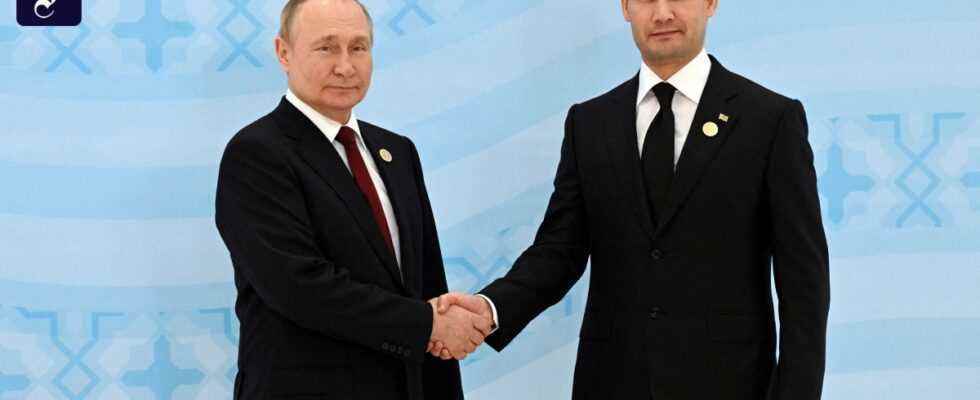An the search for new alliances, Russia’s president is treading old paths: Vladimir Putin’s first trip abroad since the invasion of Ukraine took him to Central Asia. He describes five states that emerged from Soviet republics there (Kazakhstan, Kyrgyzstan, Tajikistan, Turkmenistan, Uzbekistan) as “historic Russia”. On Tuesday Putin met the Tajik ruler Emomali Rakhmon in Dushanbe, on Wednesday he traveled to Ashgabad in Turkmenistan Summits of the Caspian Sea littoral countries (Azerbaijan, Iran, Kazakhstan, Russia, Turkmenistan). In addition, the capital, which was kept all in white by order of the ruler, celebrated the 65th birthday of the former head of state Gurbanguly Berdymukhamedow, who handed over power to his son Serdar in the spring. According to the Kremlin, Putin presented Berdymukhamedov senior with two sabers, a chess set and a sculpture called the Returning Horseman. It should also be about development, such as the production of oil and gas.
Moscow has even more hopes for BRICS, a forum connecting Brazil, India, China and South Africa. Especially since the annexation of Crimea, its exclusion from the G8 and the first Western sanctions in 2014, the Kremlin has been trying to present it as an alternative to the “West”. There is a BRICS development bank based in Shanghai, other projects are stalling. Still, in the wake of the raid, Moscow is more eager than ever to portray BRICS, whose presidents held a China-hosted virtual summit last week, as an anti-Western upsurge. Especially since Iran and Argentina want to join. Upper House member Alexei Pushkov said the possible accession would be a “breakthrough” that “undermines the West’s efforts to isolate Russia”.
India, Brazil and South Africa are blocking
The state news agency Ria quoted political scientist Sergei Markov, who is loyal to the Kremlin, as saying that Iran had wanted to join BRICS for a long time, but Western sanctions stood in the way. Now “anti-Russian bans” are also threatening China, so Iran is now likely to be included. So far, China has not plugged gaps in Russia caused by Western sanctions, for example in the areas of technology and financing, in order to avoid secondary punitive measures; like India, the country also buys Russian oil at a deep discount compared to the market price.
China in particular is pushing for new members to be added to BRICS. In addition to Argentina and Iran, Beijing wants Indonesia and Egypt to be included. However, India, Brazil and South Africa are blocking the push. Ahead of the recent BRICS summit, Beijing increased the pressure. Behind this are efforts to counteract the impression that China is internationally isolated. For the same reason, Beijing moved the BRICS meeting forward to take place immediately before the G-7 and NATO summits. The event was originally planned for July 4th.
To show broad international support, China invited 13 host countries to a development forum that was part of the summit, including Iran, Egypt, Fiji, Algeria, Cambodia, Thailand, Indonesia and Malaysia. In a speech, head of state Xi Jinping described the BRICS association as an alternative to US-led alliances, which he described as “hegemonic small circles”, while the BRICS states are a “big family”. China’s Foreign Ministry claimed after the meeting that all members supported expanding the format. However, it was heard in Beijing that South Africa was offended that China had identified possible African candidates without consulting South Africa.

